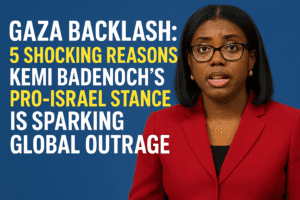Gaza Backlash: 5 Shocking Reasons Kemi Badenoch’s Pro-Israel Stance Is Sparking Global Outrage
Kemi Badenoch, leader of Britain’s Conservative Party, has sparked intense global backlash for her staunch pro-Israel stance amid the Gaza conflict. By framing Israel’s military actions as a “proxy war” for the UK and comparing it to Ukraine’s defense against Russia, she dismissed accusations of genocide and avoided condemning Israel’s blockade and civilian casualties. Critics accuse her of echoing Israeli government rhetoric while ignoring Gaza’s humanitarian crisis, including over 54,000 Palestinian deaths and a looming famine.
Political figures and human rights advocates condemn her remarks as morally bankrupt and reflective of double standards, contrasting sharply with calls from UK allies for accountability. Her position isolates Britain diplomatically and risks undermining the country’s moral authority on international law. As Gaza’s war drags on, Badenoch’s refusal to hold Israel accountable highlights a troubling divide in UK politics over ethics versus strategic alliances.
This controversy challenges global leaders to balance political pragmatism with the urgent demand for human rights and justice. Ultimately, Badenoch’s stance may define Britain’s legacy amid one of the most polarizing crises of our time.

Gaza Backlash: 5 Shocking Reasons Kemi Badenoch’s Pro-Israel Stance Is Sparking Global Outrage
Kemi Badenoch, leader of Britain’s Conservative Party, has sparked fierce backlash after framing Israel’s military campaign in Gaza as a “proxy war” fought on behalf of the UK, drawing parallels to Ukraine’s resistance against Russia. Critics accuse her of echoing Israeli government rhetoric while sidestepping accountability for Gaza’s humanitarian catastrophe.
Controversial Claims and Comparisons
During a contentious interview on Sky News, Badenoch dismissed calls to critique Israel’s tactics, stating, “It is not a genocide, as people are saying,” and declined to address Prime Minister Benjamin Netanyahu’s incendiary language. Her comparison of Israel’s offensive to Ukraine’s defensive war against invasion raised eyebrows, with critics arguing the analogy ignores critical context: Gaza’s civilian toll, Israel’s occupation, and the absence of a comparable state-backed military threat akin to Russia’s invasion.
When pressed on whether she condoned Israel’s blockade of aid and mass civilian casualties, Badenoch deflected, asserting it was “not for me to police” Israel’s actions. This stance clashes with growing international unease, including the UK’s recent suspension of trade talks with Israel—a move Badenoch sidestepped in her defense of Netanyahu’s government.
Political and Moral Backlash
Labour MP Ayoub Khan lambasted Badenoch’s remarks as “morally bankrupt,” accusing her of parroting Netanyahu’s narrative amid ongoing International Criminal Court (ICC) investigations into alleged Israeli war crimes. The ICC has sought arrest warrants for Netanyahu and former Defense Minister Yoav Gallant, while the International Court of Justice (ICJ) weighs a genocide case against Israel.
Chris Doyle of the Council for Arab-British Understanding condemned Badenoch’s silence on Gaza’s starvation crisis as reflective of “anti-Arab racism,” noting, “She aligns with leaders accused of genocide while ignoring Palestinian suffering.” Over 54,000 Palestinian deaths, collapsed healthcare, and UN warnings of famine underscore the urgency critics say Badenoch’s comments disregard.
Diplomatic Tensions and Double Standards
Badenoch’s remarks contrast sharply with a joint statement by UK Prime Minister Keir Starmer, Canada’s Mark Carney, and France’s Emmanuel Macron, who demanded Israel halt “intolerable” human suffering. Critics argue her stance isolates Britain from allies advocating accountability, while empowering Netanyahu’s far-right coalition.
Khan highlighted the hypocrisy in focusing on Israeli hostages while ignoring thousands of Palestinians detained without trial, stating, “Only diplomacy—not bombardment—has freed hostages.” Meanwhile, aid groups report Israel’s near-total blockade since March has left Gaza’s 2.3 million residents facing “man-made starvation.”
Broader Implications
Badenoch’s comments reflect a deepening divide in UK politics over Israel-Palestine. While some Conservatives frame unwavering support for Israel as a strategic imperative, others warn it erodes Britain’s moral authority and complicity in violations of international law. The Labour Party, under Starmer, faces its own internal strife, balancing pro-Israel sentiments with its progressive base’s demands for ceasefire advocacy.
A Test of Leadership
As Gaza’s war enters its 19th month, Badenoch’s refusal to critique Israel’s conduct raises questions about the UK’s role in mitigating—or enabling—the crisis. With legal experts and global leaders increasingly invoking terms like “genocide” and “forced starvation,” her position risks alienating voters prioritizing human rights over geopolitical posturing.
In an era where leaders are judged on both security pragmatism and ethical clarity, Badenoch’s stance may come to define the Conservatives’ legacy on one of the most polarizing issues of our time—a litmus test for how democracies navigate the fraught intersection of allyship and accountability.
Why This Matters:
The controversy underscores a broader global reckoning: Can nations uphold international law while maintaining strategic alliances? As legal proceedings against Israel advance, leaders like Badenoch face mounting pressure to choose between political expediency and principled diplomacy—a decision with life-or-death consequences for millions.
You must be logged in to post a comment.